.
After talking in the previous chapter about the new social gods –wild capitalism and crazy consumption– I reach, coincidentally, the city of Toruń, which used to be dearly but not so much nowadays, as a paradigm of those giving up their soul and character to the devil in exchange for the jangling glitter of money.
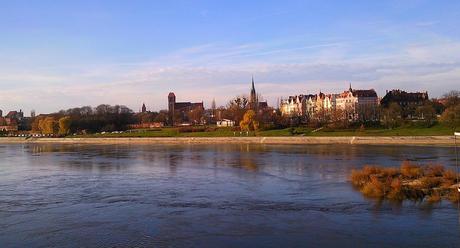
Unmistakeable view of Torun by the Visla river.
Before this metamorphosis, and precisely because of the authenticity of its beauty, Toruń used to be my favourite Polish town, where I was living for some time. It was founded (like almost all in northern present day Poland) by the germanic knights of the Teutonic Order during the late middle ages, and it has been preserved almost unharmed despite the wars, with its gorgeous historical buildings and walls on unalterable red brick, getting the southern sun on their façades, reflected on the Visla waters by whose shore the city lays. It was the craddle of the astronomer Copernicus, who has become its symbol.
But I’m not going to describe now the wonders of Toruń, nor its fast vulgarizing process along the past decade. Suffice to say that I’ve stayed a few days here for visiting some remaining friends of mine, and that a fine hot morning I take the bike again and, on a shirt, keep journeying along the muggy central Polish plain, now eastwards, towards my yearn for Podlasie, a Polish region bordering Belarus where everything started and ended; I know what I mean. A few years back I wrote these words about Podlasie, which some reader might even find poetic.
For reaching thar province from Toruń the finest route to take is Mazury (or the lake regio, as they call it here), driving slightly northward; but as I wanted to visit another friend of mine at her summer cottage in Popowo Kościelne, near Warsaw, i.e. slightly south, I had no chance but to stand the boring roads of the central plain.
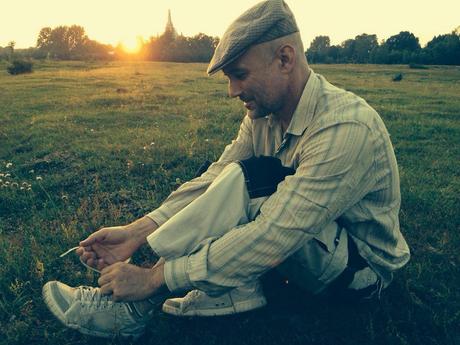
Ready for a sunset walk. Popowo Kościelne.
Therefore, I make a stopover in Popowo, at my friend’s, and the next day I stay overnight in a small town called Ciechanowiec, where the kind owner of Hotel Nowodwory, concerned about the safety of Rosaura and lacking a garage, insists that I park the bike within the very hall of the hotel, despite I told him there was no need for it, being a small town. But. to jest Polska!, he cries: this is Poland! Meaning, there is no safe town in this country.
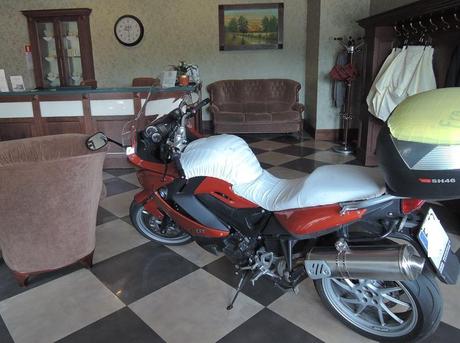
Rosaura, honour guest at Nowodwory’s.
By the way, at Nowodwory’s I ordered tatar for dinner, one of my favourites in Polish cuisine. Tatar is no dish for the faint-hearted: chopped raw meat served with a raw yolk, onion and pickles. Ideal if accompanied by a shot of vodka.
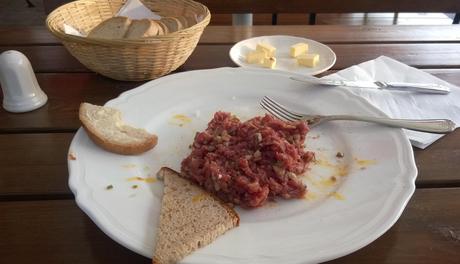
Tatar wołowe.
Thus, from Toruń, and always keeping away from the busy main routes, three days later Rosaura and me arrive finally to the capital of Podlasie: Białystok.
Despite my strong emotional bounds with this city, I admit there’s nothing special about it except perhaps for the noticeable amount of beautiful women; which is certainly no small merit. But, lacking a real old quarter, and having been developed mostly during the socialist period, and despite calling itself the Versailles of Poland, the most a tourist can do is paying a visit to the emblematic Branicki Palace (built by an ambitious hetman who wanted to become king of Poland), exploring its splendid parks and walking up and down along the only pedestrian street in town, Lipowa, which gathers most of the commerce and the atmosphere.
On such street there is a plaza, and on the plaza there is a restaurant: Esperanto, thus called because in Bialystok the jewish Lezer Levi Zamenhof was born, who would invent the famous but unsuccessful universal language.
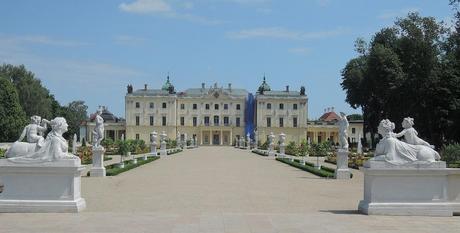
Branicki Palace, in Bialystok.
By the way, to say that Zamenhof was Polish is to twist grammar and history a bit; it’s like saying that Julius Caesar was Italian or that Mozart was Austrian. Zamenhof was mostly Jewish (and we all know that these people don’t admit other nationality than their own), from Lithuanian ascendant, and was born when Bialystok was part of Russia. Actually, he was bilingual Yiddish-Russian, and only later he’d learn Polish, along with Hebrew and some other languages.
Living in this Babylon where clash and trouble among people who talked different languages arose every day, quite sensibly Zamenhof concluded that the main origin of hatred and prejudice among people comes from mutual misunderstanding, and that language is the highest wall between nations, a much more powerful and effective obstacle than any arbitrary border. Hece his interest in devising a common tongue. But his well-meant proyect was doomed to fail from the beginning, because the Lithuanian Jew oversight was to forget that people rather stick and even die for their prejudices and chauvinism rather than live in harmony if this means to give up preserving such important part of ourselves as our mother tongue is.
It’s certainly a hard task to decide on “what it is nobler in the mind to do” in such cases and how much should we endeavour for evening out language barriers, i.e. to let die what comes from generations back and has become part of ourselves; but whichever the answer to that question is, there is no doubt that only resentful and unlimber minds would raise such barriers, or create them, where they didn’t exist before; only utterly narrow minded people would want to revive dying languages, reopen forgotten debates and stir up problems that were already disappearing by themselves. Such is the case of Galician, Basque and Catalan in Spain, or Gaelic in Ireland, Lappish in Finland and many other examples.
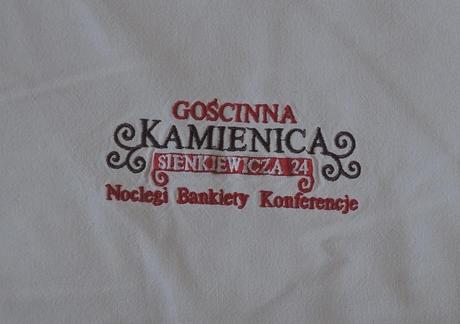
Embroidered linen at Kamienica Hotel. Good old style.
But let’s languages aside and take a look at how children reach their own dreams by Café Esperanto. On hot summer days, it’s customary in Poland (and a privilege o a country where there is no shortage of water) to hook a wide hose to a hydrant and place an iron plate very near the other end, both attached to the ground in the middle of the street, thus creating a water screen where people can play or whatever. And it’s quite a joy to stand by one of these “fountains and watch how children play, soaked to the bone, trying once and again to cross the magic rainbow.
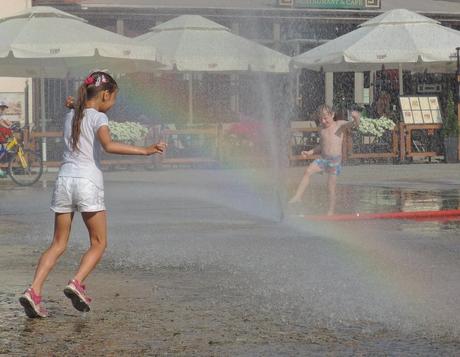
Childen playing under the iridescent water.
Maybe these images are but a metaphor about my own motorcycle journey to nowhere. But, in any case, who among us has never dreamt with also reaching the rainbow?
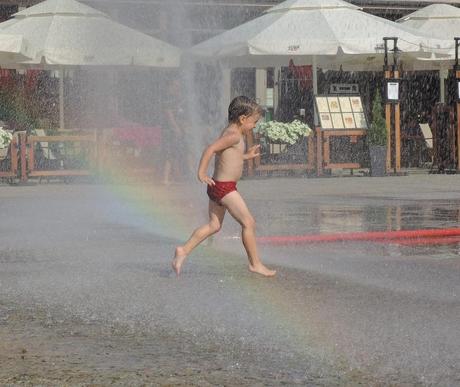
Through the rainbow.

